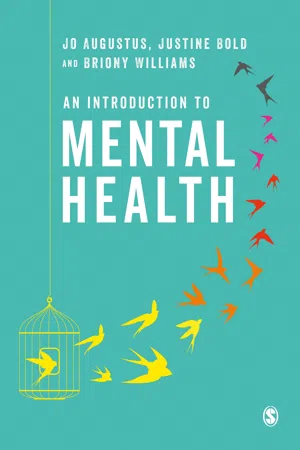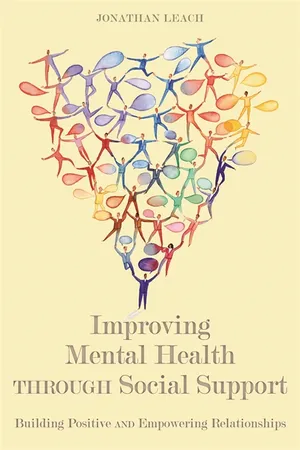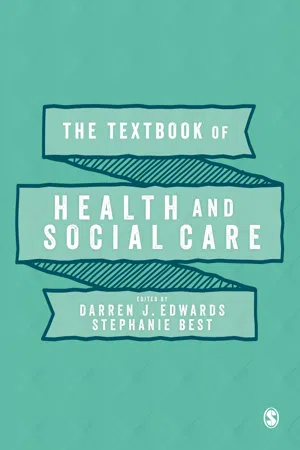Social Sciences
Sociology of Mental Health
The sociology of mental health examines the social factors that influence mental well-being, including how societal structures, cultural norms, and social interactions impact mental health and illness. It explores the ways in which social institutions, such as family, education, and healthcare systems, contribute to the understanding and treatment of mental health issues within a broader social context.
Written by Perlego with AI-assistance
Related key terms
9 Key excerpts on "Sociology of Mental Health"
- eBook - ePub
- Alan Clarke(Author)
- 2013(Publication Date)
- Routledge(Publisher)
In a similar vein, Ustun (1998) comments upon operationalising the concept of mental well-being as contained in the WHO’s definition of mental health quoted above. He describes the concept of mental well-being as covering four major dimensions: ‘the capacity to live, function and enjoy’, ‘the optimum development of mental abilities’, the ‘subjective feeling of well-being’ and ‘the interaction and equilibrium between the individual and the environment’ (Ustun, 1998, p. 72). According to this comprehensive approach, the attainment of mental stability is dependent upon the individual having the psychological processes and mental ability to cope with any problems they encounter. There is also the recognition that as a result of environmental factors opportunities for personal growth might be limited, thereby preventing people from realising their full potential.Sociological approaches to the study of mental illnessNot all sociological work on explanations of mental disorder is grounded in social epidemiology. Some sociologists of deviance, especially writers of a symbolic inter-actionist persuasion, … have paid particular attention to interpersonal dynamics in the development of disorder.(Busfield, 2001, p. 8)There is more than one sociological perspective on mental illness. Two major perspectives are reviewed in this section: the interactionist and the social causation or structuralist. These are founded upon different assumptions about such fundamental issues as the nature and origin of mental disorder.Interactionist perspectiveThis perspective has its philosophical roots in a theoretical approach in sociology known as symbolic interactionism, which when applied to the study of deviance in the 1950s and 1960s gave rise to social reaction theory, also commonly referred to as the labelling perspective. Thomas Scheff (1966) is often credited with being the first theorist to produce a coherent sociological theory of mental illness based on the labelling approach. To appreciate his contribution we need to understand something about the basic thinking behind the labelling theorists’ interpretation of deviant behaviour in general. - eBook - ePub
- Sarah Nettleton(Author)
- 2020(Publication Date)
- Polity(Publisher)
(2011). Mental Illness. Cambridge: Polity. An invaluable critical introduction to sociological debates. Cockerham, W. (2017). Sociology of Mental Disorder, 10th edn. Abingdon: Routledge. A comprehensive text that includes critical analysis and illustrative data and examples to prompt discussion. Rogers, A. and Pilgrim, D. (2014). A Sociology of Mental Health and Illness, 5th edn. Maidenhead: Open University Press. An established textbook – rightly so – which is highly accessible for both sociology students and health practitioners. Scheid, T. L. and Wright, E. R. (eds) (2017). A Handbook for the Study of Mental Health: Social Contexts, Theories and Systems. Cambridge: Cambridge University Press. This is a comprehensive resource with chapters by key scholars in the field. Yang, J. (2018). Mental Health in China. Cambridge: Polity. Comprehensive, clear and a compelling read about mental health in contemporary China. - eBook - ePub
- Jo Augustus, Justine Bold, Briony Williams(Authors)
- 2019(Publication Date)
- SAGE Publications Ltd(Publisher)
9 Societal Influence on Mental Health Jo AugustusLearning Objectives
After studying this chapter you will be able to:- consider societal influences on the perception of mental health;
- describe the historical context of societal influence;
- understand barriers that may restrict access to recovery;
- understand theories and models that underpin stigma and discrimination.
Introduction
Societal influence is a term often used to describe the influence an individual or individuals can have on one another. For example, this could be a change in our belief system or behaviour as a result of an intentional or unintentional behavioural change of another individual. Such influence can have a profound impact on individuals accessing mental health services (Kawachi et al. 1997). As a culturally diverse society, mental health service provision has to be responsive to the social and cultural needs of its local population. Here culture is referred to as shared sets of beliefs and values between social groups (Hofstede 1991). Therefore, cultural and societal influence, are closely linked. It is important to note that culture is not the only factor to consider when trying to understand the issues surrounding access to services. It is evident that misinterpretation of culturally bound symptoms can impact on access to mental health services (Webber, Huxley and Harris 2011). Therefore, organisations need to be competent in the services they provide. However, in order to provide culturally competent services, there has to be an understanding of the influence of society and culture on mental health, which this chapter will explore (Kawachi et al. 1997).The Culture of the Individual and the Professional
Historical context
At the beginning of the nineteenth century, Western medicine recognised that the social aspects of an individual had an impact on disease, which arguably led to the advent of public health. The mid-nineteenth century saw the introduction of psychoanalysis as a way to treat mental health. The twentieth century brought an understanding that social and psychological components are of importance, in addition to the bio-medical (Porter 1997). There have been extensive developments in the provision of mental health services since the 1970s. In particular, the shift towards care provision in the community rather than inpatient settings and the awareness of cultural diversity (Shorter 1997). In addition, the publication of DSM-IV in 1994 gave more detailed references to cultural variation than earlier editions, encouraging a cultural formulation approach to be taken within the assessment (APA 1994). Although the bio-psycho-social model is subject to current criticism, it remains a helpful frame of reference (Engel 1980; Pilgrim 2011). Such an integration of approaches to the assessment and treatment of mental health enables a whole-person or holistic approach and provides the platform to meet specific cultural needs. See Chapter 1 - eBook - ePub
Improving Mental Health through Social Support
Building Positive and Empowering Relationships
- Jonathan Leach(Author)
- 2014(Publication Date)
- Jessica Kingsley Publishers(Publisher)
Chapter 2 Social aspects of mental health and distress IntroductionThe American sociologist C. Wright Mills suggested that one of the key roles of the sociologist is to illuminate how seemingly private troubles are actually public issues (Mills 1970). For instance, in the late 19th century, Emile Durkheim realised that something as apparently personal and individual as suicide, when looked at in terms of the levels of incidence in different countries and social groups, seems to be influenced by the type of society in which the person lives (Durkheim 1971, first published 1897). In contrast to psychological understandings of friendship, social interactions and mental distress, which focus on the characteristics of the individual, sociology looks at the wider social contexts within which that individual operates. This chapter will explore some of the theories that attempt to explain issues of mental distress, identity and relationships and the impact of social contexts on mental health.Understanding mental health problemsIn the previous chapter, it was suggested that mental health problems can be understood from a number of perspectives including the bio-medical, psychological and social. This chapter focuses on theories that inform social perspectives, as these are particularly relevant to the exploration of social support for mental health. A broad range of social and sociological theories suggest that what might at first seem to be individual and personal problems can also be understood within a social context.Friendships tend to be made when people identify themselves as similar in various significant ways (Allan 1989). So when considering the need for social support, it is useful to examine whether having a ‘mental disorder’ can be distinguished from the commonly experienced problems of distress and unhappiness in life. If there is a distinction, it could mean that people labelled as ‘disordered’ are seen as different in some important sense by those around them. In this case, there might need to be an extra dimension to the support offered to people who have a diagnosed disorder, over and above what one friend might do for another during difficult times. The idea of two continua, one for mental disorder and one for mental health, has already been proposed in Chapter 1 - eBook - ePub
Contemporary Health Studies
An Introduction
- Louise Warwick-Booth, Ruth Cross, Diane Lowcock(Authors)
- 2021(Publication Date)
- Polity(Publisher)
This chapter will introduce you to the discipline of sociology and demonstrate its relevance to studying and understanding health. A detailed discussion about the importance of sociology for health is provided later, but a key aspect of this is the way in which the discipline explores social divisions as determinants of health. The chapter will demonstrate how sociology as a discipline contributes to our understanding of health as primarily socially influenced. The chapter outlines what sociology is as a discipline and analyses how different theoretical perspectives contribute to understanding health and illness. The chapter discusses the social model of health, looking critically at the medical model of health in relation to health inequalities. The chapter uses a sociological lens through which to view aspects of health and health-related behaviour, showing that by using such a mechanism we can begin to view health, health-related interactions and behaviour both differently and more critically. Finally, the chapter uses the theory of social construction to explore disability and offers the reader a case study to discuss the medical management of sleep.What is sociology?
Sociology is the study of interaction between groups and individuals in human society and involves the critical examination of everyday aspects of human life. Sociology as a discipline examines both the macro and themicro-level, examining large organizations and institutions such as the economy, education and work, as well as looking at individual behaviour such as the interactions that take place between people. Sociology also explores the relationships and interactions between the two; how does society influence individuals and conversely how do individuals influence society? So sociology is interested in social processes and how society is structured and works (Jones and Bradbury, 2018). A key lesson that can be drawn from sociological theory and research is that social structures can often exert more influence over our behaviour than we would expect, and this is certainly true in relation to health, which is significantly influenced by the social context in which we live. Our health is socially determined, and the chapters in part III of this book offer a more detailed discussion of specific determinants. Sociology explores many dimensions of health, illness and health care. Sociological research has also been crucial in drawing attention to the experiential aspects of health and illness. For example, examining doctor–patient relationships and lay perspectives about health and illness (these are discussed in depth in chapter 5 , research related to health is also discussed in depth in chapter 3 - eBook - ePub
Global Mental Health
Anthropological Perspectives
- Brandon A Kohrt, Emily Mendenhall, Brandon A Kohrt, Emily Mendenhall(Authors)
- 2016(Publication Date)
- Routledge(Publisher)
Part I Social and Structural Origins of Mental Illness in Global Context Brandon A. Kohrt and Emily MendenhallPlacing focus on the social and structural origins of mental illness highlights that low- and middle-income countries bear the burden of social risk factors such as poverty, war, infectious disease, child mortality, and food and water insecurity. On a population level, one social epidemiological fact is clear: poor mental health is correlated with poverty (Lund et al. 2010 ; Lund et al. 2011 ). Stressful living conditions associated with poverty, such as interpersonal violence, political violence, food insecurity, limited access to health care, untreated physical illness, and a variety of other variables, have been examined in detail in research about the social determinants of health (Wilkinson and Marmot 2003 ). Different from behavioral facts, the social determinants of health are almost never modifiable by individuals. Rather, they are taken-for-granted aspects of unequal socioeconomic systems characterized by political ideologies that systematically oppress the poor.Understanding how social and structural factors underlie and shape mental illness is a central theme of medical anthropology. Calling it the new cross-cultural psychiatry, Harvard anthropologists Arthur Kleinman, Byron Good, Mary-Jo Delvecchio Good, and colleagues placed focus on how social suffering fuels mental illness (Kleinman 1997 ; Kleinman and Good 1985 ). For example, Kleinman’s research and collaborations focused on the social origins of suffering, stigma, and morality, including the role of medical systems, in shaping trajectories of suffering differently in China and the West (Kleinman 1982 , 1997 , 2006 ). The research on social suffering also built upon the writings of Norwegian scholar Johan Galtung (1969) on structural violence. Galtung’s original definition of structural violence refers to processes that erode human needs, and has since been amended to incorporate social and material needs. Through the work of Kleinman’s students Paul Farmer and Jim Kim, the importance of structural violence became a central focus in global health research (Farmer 2003 , 2004 - eBook - ePub
- Darren Edwards, Stephanie Best, Darren Edwards, Stephanie Best(Authors)
- 2020(Publication Date)
- SAGE Publications Ltd(Publisher)
Chapter 1 Sociology of Health and Illness Ashley FrawleyOverview
This chapter introduces the sociology of health and illness, first by considering the meaning of the ‘sociological imagination’ and associated importance of the concept of context to understanding human social life. It then discusses three contexts of health: socio-economic, institutional/professional and cultural. Within these contexts a number of key issues in the sociology of health and illness are considered: the social determinants of health, health inequalities, challenges to medical authority, social construction and health panics, medicalisation and growing cultural preoccupations with health risks.Learning Outcomes
By the end of this chapter you will be able to:- Define the ‘sociological imagination’ and its relationship to the concept of context
- Discuss the relationship between socio-economic context and health inequalities
- Critically examine different explanations of health inequalities
- Discuss several developments argued to indicate the decline of medical authority
- Explain and apply theories of social construction and medicalisation to think critically about health risks and panics
Introduction
Health and illness may seem solely individual matters. However, sociologists draw attention to social patterns in health and illness, seeking to situate our experiences and beliefs within broader social, historical and cultural contexts. This chapter introduces key concepts from the sociology of health and illness, beginning with an exploration of the ‘sociological imagination’ and importance of ‘context’ to understanding human social life. First, we examine socio-economic contexts of health in relation to social determinants and health inequalities. The context of health care professions is then considered with attention to changing professional relationships as well as challenges to medical authority. Introducing social constructionism, the cultural context of health is explored with reference to medicalisation, moral panics and risk. - eBook - ePub
Sectioned
Social Services and the 1983 Mental Health Act
- Franz Brentano(Author)
- 2002(Publication Date)
- Routledge(Publisher)
Chapter 6 THE SOCIAL PERSPECTIVE ON MENTAL DISORDER AND MENTAL HEALTH PRACTICEOur argument throughout this book has been that the medical perspective on mental health and mental disorder needs to be balanced by a social perspective. Although this is implied by giving social services departments statutory responsibilities under the mental health legislation, the dominance of the medical perspective over definitions of mental disorder and how it should be treated, and over resources currently available to help those with mental health problems, is such that the social perspective has not really had the chance to show what it can offer.In this chapter we adopt a different perspective from that taken up to now in this book, and look at how the 1983 Act has been implemented in terms of the equity of the experience of people in different circumstances and with different characteristics. The first question we have to ask is: who is being referred for consideration of action under the legislation, and second, are the outcomes of such referrals different for different groups of people? Our purpose here is twofold: to explore evidence about the extent to which mental disorder is experienced or identified more frequently amongst different groups, and then to look at any evidence of different responses to these groups once they have come to the attention of mental health professionals.Ray Cochrane (Cochrane, 1983:3) has said that ‘fluctuations in the incidence of disorders over time, place and social category are too large ever to be explained away by the differential incidence of some purely biochemical imbalance’, and that understanding of the social context in which mental disorder is experienced is crucial to the development of resources that go beyond mere palliative measures. We suggest that understanding of the social construction of mental illness is insufficiently developed in the professional training of those most likely to adopt a social analysis of mental disorder. Social workers have failed to develop a language and intervention to reflect the social analysis they may be expected to proffer. Nor have they been sufficiently aware of the way in which their professional practice may reinforce dominant social ideologies affecting the identification and definition of mental disorder. - eBook - ePub
- Ewan Ingleby(Author)
- 2017(Publication Date)
- SAGE Publications Ltd(Publisher)
The two quotations from the authors Sylvia Plath and Ken Kesey highlight concerns that have existed over mental illness in the West. Some academics (for example, Thomas Scheff) have drawn attention to the controversy that is present in this area of health and care. There is even a question as to whether or not mental illness actually exists. The argument runs that mental illnesses are forms of deviant behaviour, and the behaviour of those who are mentally ill is troubling for the social order. This requires intervention and control. This theme will be explored in this chapter. Mental health is a key area of social work. In order to develop our professional work as social workers in this area, it is important to reflect on what sociologists are interested in when they consider the nature of mental illness.Functionalist interest in mental illness
We have seen that functionalists are interested in wider social factors. With mental illness, they consider the social organisation of health systems. Functionalists regard key social organisations as similar to the vital part that key organs play in the human body. The health system of a social group is visualised as being akin to the role that the heart plays in the body – as long as the heart remains healthy, so the body functions effectively. Similarly, as long as the health system of a social group is effective, so that social group can function efficiently. Functionalist sociologists are also interested in the ways in which understandings of mental illness have changed in societies over time. A number of social scientists have reflected on changing interpretations of mental illness to outline the social factors that influence our understanding of the mentally ill. Hirst and Woolley (1982) apply the work of the French philosopher Foucault in order to demonstrate how wider social structures change and, in turn, impact on our understanding of mental illness. Hirst and Woolley reveal that, in societies such as England’s, there has been a change in perceptions of what contributes to mental health and well-being. In Victorian England, religious explanations were applied in order to help understand mental illness. The mentally ill were literally removed from society and placed in asylums – institutions that were isolated from the rest of society. The mentally ill and their families were regarded as being punished by God for some kind of transgression against ‘his divine law’. Hirst and Woolley (ibid.) reveal that, over time, this social interpretation of mental illness changes in societies such as the UK’s. Through the nineteenth century, a scientific interpretation of mental illness replaces this religious explanation. There emerges a medical model of mental illness: Hirst and Woolley suggest that this medical model depends on a particular train of thought. ‘Condition A’ is expected to respond to ‘Treatment A’ and to improve. The challenge with many mental illnesses appears to be that they do not respond to this course of action. In the quotation from Plath, her treatment sounds more like something you would experience upon being tortured! The problem for the doctors and nurses treating mental illnesses is that the illness does not appear to improve following this medical model of care. Hirst and Woolley (1982) outline which social factors influence mental health and this is of interest to functionalist sociologists. Mental illness is reinterpreted, and we see the emergence of ‘care in the community’ in the UK in response to a failing set of arrangements for the mentally ill. The asylums are closed and a new form of treatment is offered that appears to be less punitive and more humane. The critical factor in these changes is not so much the ‘illness’, but the social understanding of mental illness.
Index pages curate the most relevant extracts from our library of academic textbooks. They’ve been created using an in-house natural language model (NLM), each adding context and meaning to key research topics.








